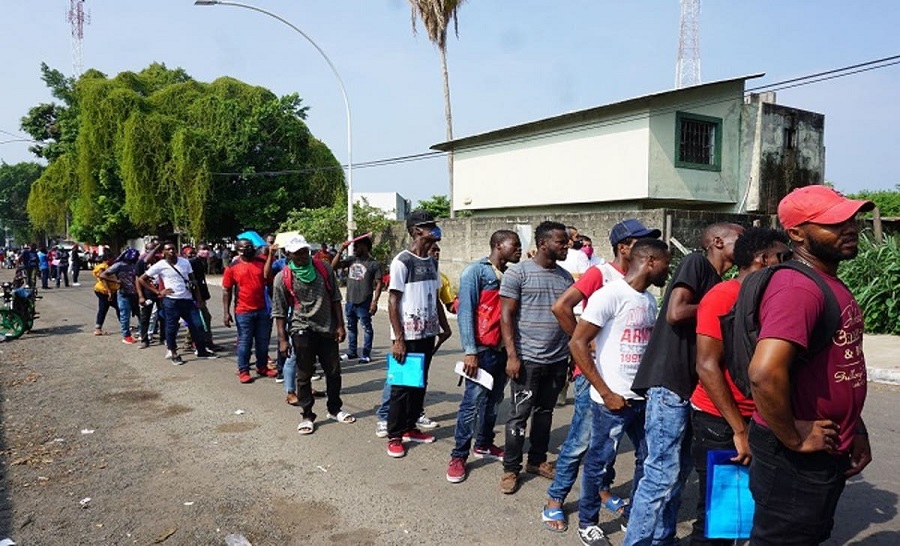RIO DE JANEIRO, BRAZIL – Haitian migrants who this week reached Honduras, on their way to the United States in a journey that began in Chile, denounced having been victims of abuses by authorities and “coyotes” in all the countries they have traveled through.
“In Peru, the Police have robbed me when I passed through customs; they robbed me, in Ecuador, the Police forced me off the bus and told me if you don’t pay US$100 or US$200, we’re going to send you back,” said a Haitian who identified himself as Cevenson Beneche, 26, who left his country on January 2nd, 2017.

Speaking good Spanish, Beneche said in Choluteca, in southern Honduras, that until a year ago he was living in Chile, and that a month and five days ago he set out for the United States, where two of his brothers and his mother live.
“WE ARE NOT ILLEGAL,” HE SAYS, COMPLAINING ABOUT THE ABUSES
He added that the situation is very difficult because they suffer many irregularities that should not occur because they are foreigners, even if they do not carry documents.
“We are foreigners, but we are not illegal, we have no papers, no documents, but we are traveling, I can not say illegal, it is a legal trip because when you have a very difficult life, you have to search for a better life, because you leave your family behind,” he emphasized.
The migrant, as well as other compatriots and dozens of Cubans, on Thursday rushed through the city of Choluteca completing procedures at the National Migration Institute (INM) and local banks to pay the fine, according to the law, of about US$200, for having illegally entered Honduras.
The Caribbean immigrants, many of whom were staying in modest hotels and shelters such as Hogar de Esperanza, mostly preferred not to speak to journalists.
In general, migrants travel in small family groups, although this is not Beneche’s case, who travels alone and said that he is an IT professional and speaks 4 languages, English, Spanish, French and Creole.
SOME 3,000 HAITIANS ARE EXPECTED TO MOVE THIS WEEK
Beneche said that so far the “gentlest” treatment he has received in his long journey has been in Honduras, but entering the country from Nicaragua “is very difficult because the police closes the border,” which forces them to get off the bus in which they are traveling and “run ahead” of the security forces, “who search for us at night.”
In his opinion, migrants are harassed by police and human traffickers, known as “coyotes”, who “in all countries” complicate their situation by making them get off the buses in which they travel.
“The guides (“coyotes”) tell us, if you pass here the Police will get you, but if you pay US$200 or US$250 they take you to another place, where they steal your money. It is very difficult, the road is terrible,” said the Haitian, adding that during his passage through Panama he saw a large group of his compatriots, possibly 3,000 of them, trying to leave the country.
He also pointed out that he left Haiti on January 2nd, 2017 because the situation was “very difficult, very complicated”, and that despite having “several degrees and speaking four languages, I can’t find work.”
“I have to look for a place to find work, because in the future I would like to have a family, children, and I have to look for a better life for them. A young person like myself doesn’t need to have just one dream, he or she should have several,” he stressed.
SITUATION WILL BE MORE COMPLICATED
Beneche is clear that his goal is to reach the United States to be with his mother, whom he said that, if it were not for her help, he could have been stranded in Panama or Nicaragua.
According to his account, so far he has spent about US$3,000 along the journey.
“If the situation is difficult everywhere now, in 2 or 3 years it will be more complicated,” said the migrant, who is almost 2 meters tall.
For many years Honduras has been an obligatory passage for Latin American, African and Asian migrants seeking to reach the United States illegally.
The migrant flow has been increasing in the last 20 years due to the worsening of living conditions in their countries.
Most migrants, because they do not carry documents, enter Honduras irregularly through “blind spots,” so as not to be detected by immigration authorities, for which they hire human traffickers, who often abandon them, either in the south of the country, bordering Nicaragua, or in the west, bordering Guatemala.
As a result of some statements made by U.S. President Joe Biden, aimed at helping migrants enter the country regularly, the crossing of foreigners through Honduran territory has increased this year, according to immigration authorities, now with Haitians in greater numbers, including men, women, and children, followed by Cubans.
Source: efe

